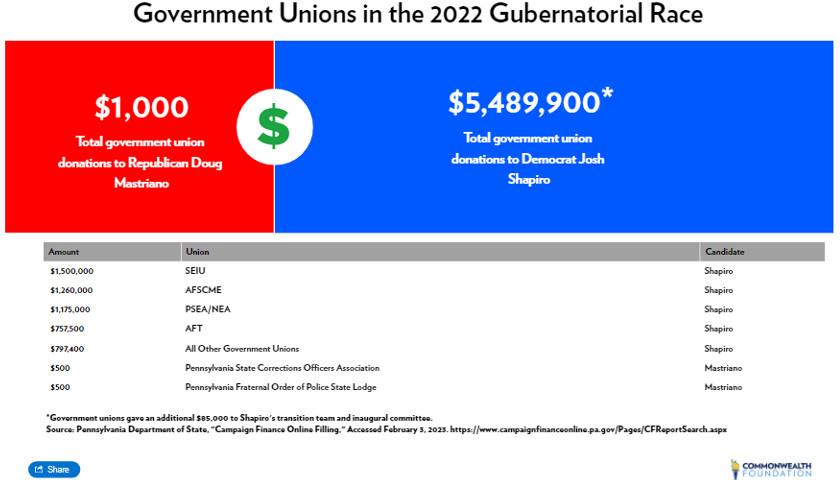Posts tagged Commonwealth Foundation
Teachers union presidents blast Supreme Court affirmative action ruling
July 17, 2023 // Weingarten said, “At the end of the day, those of us in education, and frankly for those of us in Labor … we fight for a better life for everyone. Neither of us are going to stop fighting for what kids and communities need to succeed,” Weingarten said. “Whether that kid is dyslexic or scarred by social media issues or, frankly, whether that kid, because schools were closed for a long time, has issues because of that.” Those words stand in stark contrast to her and her union’s actions, such as when AFT handcrafted school shutdown policies at the Centers for Disease Control (CDC) federal agency in early 2021. Based on released emails, AFT sent a list of suggestions (which included closing schools) to the CDC, and the CDC adopted much of the AFT’s list in their final public health guidance that kept schools closed.
CELEBRATING THE HISTORIC JANUS DECISION FIVE YEARS LATER
June 27, 2023 //
Gov. Shapiro, Choose School Choice Over Union Power Grabs
May 18, 2023 // Government union PACs spent more than $20 million in Pennsylvania during the 2021–22 election cycle. More than 92 percent of those contributions went to Democratic candidates and causes. The money helped Democrats gain a majority in the state’s House of Representatives for the first time in 12 years. House Democrats, plus one lone Republican, have now backed the top priority of union executives. House Bill 950, a proposed constitutional amendment that would impose union mandates on employees who do not necessarily share the political agenda of union leaders, passed 102 to 99 on May 3. The bill takes its inspiration from a law out of Illinois that prohibits elected officials from advancing right-to-work initiatives that safeguard First Amendment rights. Josh Shapiro, the commonwealth’s Democratic governor who took office in January, has been a consistent opponent of right-to-work laws. However, he has not yet publicly commented on the push for union mandates in the current legislative session.
Pennsylvania House Committee Passes Forced-Unionism Amendment
May 4, 2023 // “No law shall be passed that interferes with, negates or diminishes the right of employees to organize and bargain collectively over their wages, hours and other terms and conditions of employment and work place safety,” the proposed amendment reads. State Representative Elizabeth Fiedler (D-Philadelphia), the avowed socialist who authored the bill, claimed in committee testimony that employers routinely violate workers’ rights to organize and collectively bargain. She said some employers hold seminars and “bombard” employees with literature meant to “scare” workers out of unionizing. “This constitutional amendment will help prevent future attacks on workers and their rights,” Fiedler said. “And, with this constitutional amendment, we can prevent future laws that seek to silence workers. Strong unions benefit everyone and the decline of unions has played a big role in rising inequality and wage stagnation.”

Pennsylvania Government Union Political Spending Skyrockets Even as Membership Declines
March 23, 2023 // “At a time when government unions are losing membership due to partisan political spending, government union executives have really decided to double down on the partisan political spending,” CF policy analyst Andrew Holman told The Pennsylvania Daily Star. “The recent data shows this. They’re using millions of dollars collected with taxpayer resources to fund these political-advocacy activities and I think that, really, members of government unions need to be aware of where their money is going and what their unions are advocating for.” Democratic Governor Josh Shapiro is a prime example of a Pennsylvania pol enjoying overwhelming advantage in this political-spending category. Government unions bestowed over $5.5 million on his 2022 campaign while state Senator Doug Mastriano (R-Gettysburg) garnered a mere $1,000 from these associations while running against him. Public-sector labor money was only slightly less lopsided between the candidates for lieutenant governor: Democrat Austin Davis raised $77,000 from these groups while his GOP state House colleague Carrie Lewis Delrosso got only $1,550 from them.

As Membership Rate Falls, Unions Double Down on Politics
March 10, 2023 // Labor unions portray themselves as champions of the little guy – standing up for workers against powerful special interests. But declining union membership rates suggest that many workers are no longer convinced that unions speak for them. The latest data from the Bureau of Labor Statistics show that in 2022, the overall union membership rate fell to its lowest levels since the government began tracking it in 1983. Just 10.1% of wage and salary workers belonged to a union, down from 10.3% in 2021 – only about half the 20.1% rate of 1983. In other words, nearly 9 out of 10 American workers are not in a union, despite union efforts to organize them.

I4AW Adds Three Labor Voices to Prestigious Senior Fellows Program
January 30, 2023 // These new fellows- Ken Girardin, David Osborne, and Mailee Smith- have impressive backgrounds as policy leads at the foremost labor policy organizations in the country. Their work is bridging the information gap with data and analysis that show how outdated labor policies and special interest politics are harming a large swath of the American workforce and producing hostile economic conditions for workers and small business owners. “We are proud to highlight the important research and analysis that Ken, Mailee and David are contributing to the labor policy debate,” said president of Institute for the American Worker, F. Vincent Vernuccio. “These new fellows and their respective organizations are on the cutting edge of labor policy, and we are honored to include them on the I4AW team.”
Virginia Drops from A+ to C in Worker Freedom — Largest Decrease in the Country
October 31, 2022 // Virginia plunged from an “A+” ranking in 2019 to a dismal “C” this year. This was due to what the report called “[t]he most dramatic government union victory of the post-Janus legal frontier” – Janus being the 2018 Supreme Court case Janus v. AFSCME declaring everything government unions do is political, and public employees have a First Amendment right not to subsidize this political activity. It essentially brought right-to-work provisions to public employees across the country. The Battle for Worker Freedom in the States: Grading State Labor Laws
Major government unions lose over 200K members
October 3, 2022 // The top four public labor unions in the U.S. lost hundreds of thousands of members since a 2018 Supreme Court case that ruled government employees could not be forced to pay a union to keep their job, a new report shows that. The Commonwealth Foundation released the report, which found that the top four public labor unions – AFT, AFSCME, NEA, and SEIU – lost nearly 219,000 members altogether since the Janus v. AFSCME ruling. “The Janus decision to end forced unionism for government workers accelerated a long-term decline in membership,” the report said. “In response, government unions are conducting aggressive campaigns to unionize new workers with recent successes in Virginia and Colorado.”

Top Unions Lost Nearly Quarter of a Million Members After Court Struck Down Mandatory Membership
September 30, 2022 // Report shows powerful public sector unions have stepped up lobbying efforts amid member exodus In the four years since the landmark Janus v. AFSCME ruling, the National Education Association, American Federation of Teachers, Service Employees International Union, and American Federation of State, County, and Municipal Employees lost almost 219,000 union members. The report, published by the Commonwealth Foundation, found that the Supreme Court decision escalated a decades-long decline in dues-paying members at the public sector unions. Despite the drop in membership, labor groups have scored legal and political victories that are buoying their political power. Union bosses scored a major victory last year in Virginia, where they attained collective bargaining rights for government workers for the first time through the then-Democratic-controlled state house. The Missouri Supreme Court last year voided a law that would have required unions to have regular recertification votes and annual reports on political activity. Colorado, meanwhile, passed a law in 2020 that unionized its 30,000 state government employees. Jennifer Stefano, Rebecca Friedrichs, California Teachers Association,
